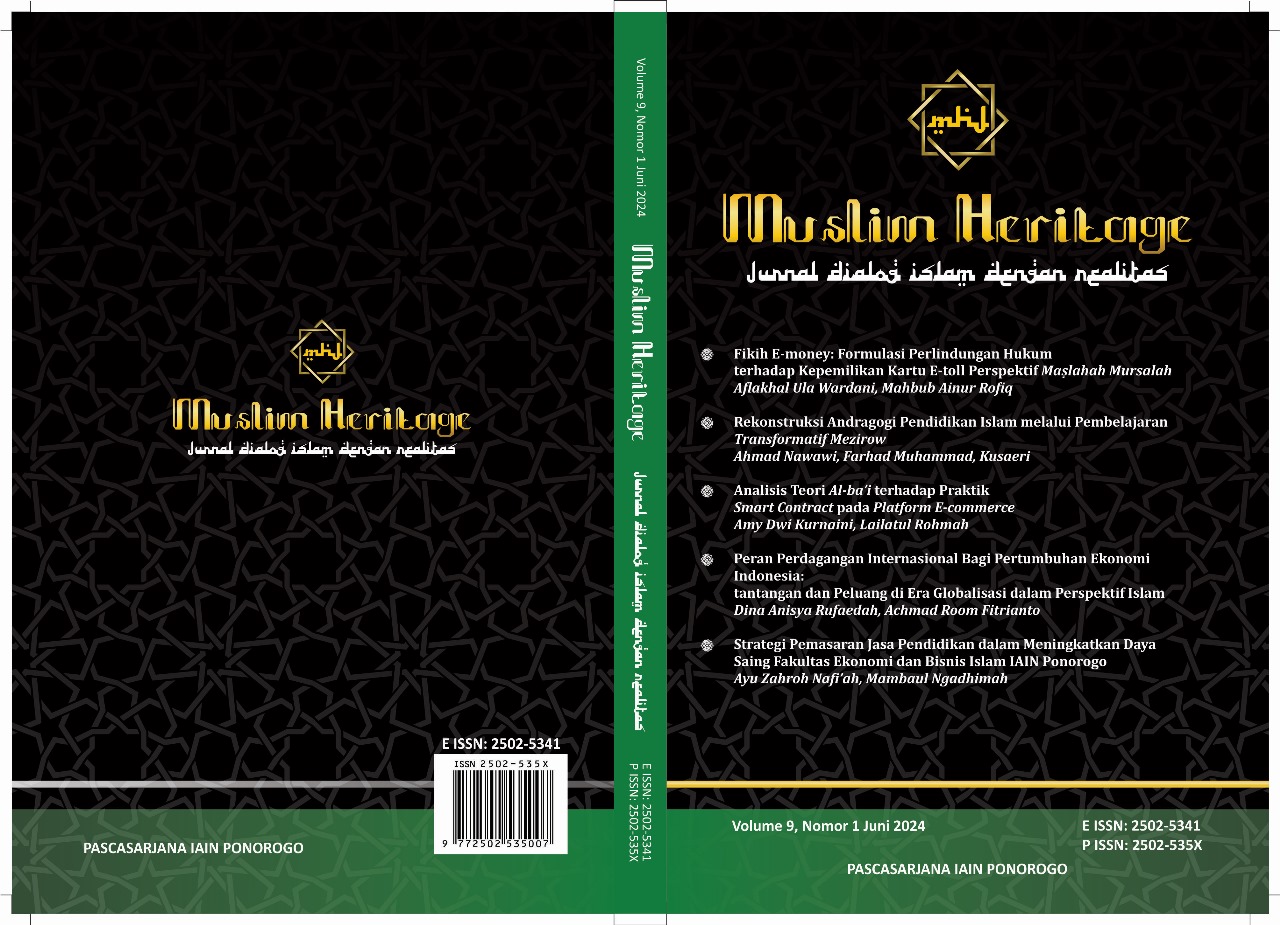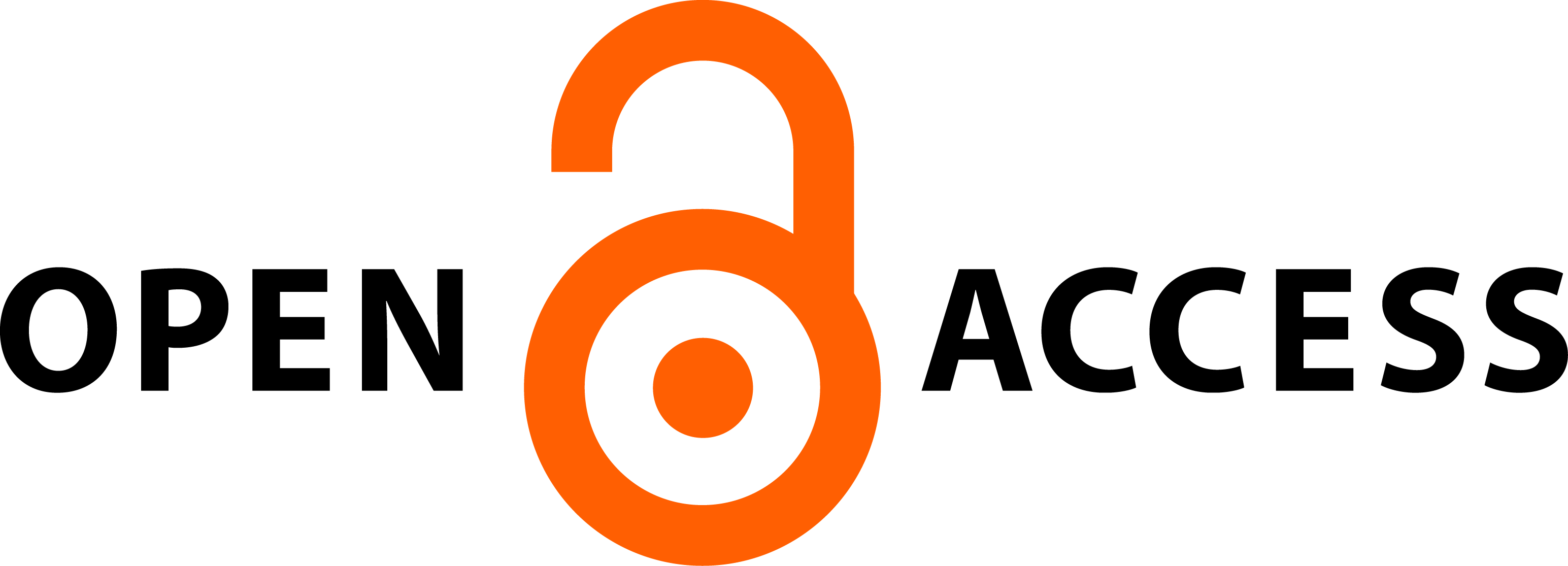IDENTIFIKASI PENGGUNAAN MEDIA SOSIAL DAN DAMPAKNYA PADA KINERJA PEMASARAN DALAM PERSPEKTIF EKONOMI ISLAM PADA USAHA SKALA MIKRO DI KABUPATEN BANYUMAS
DOI:
https://doi.org/10.21154/muslimheritage.v9i1.7555Abstract
Abstract
This research aims to determine the role of entrepreneurial orientation on the use of social
media and marketing performance with innovative ability as a moderating variable in micro
scale businesses in Banyumas Regency. The sample in this study was determined using slovin
and sampling using the purposive sampling method and the sample size was 100 respondents.
The data analysis technique used in this research is partial least squares (PLS) analysis. The
research results show that it partially has a positive and significant effect, while the use of social
media partially mediates the effect of entrepreneurial orientation on marketing performance.
Mediation in this research model is partial, in other words, the use of social media has a function
to bridge the influence of entrepreneurial orientation on marketing performance. However,
because the mediation characteristics are partial, even without the social media use variable,
entrepreneurial orientation is still able to influence marketing performance positively and
significantly. These results confirm that entrepreneurial orientation can increase and strengthen
the use of social media by micro-scale business actors in Banyumas, which will also have an
impact on improving business performance. Furthermore, innovative ability does not moderate
the relationship between the use of social media and marketing performance. Entrepreneurial orientation, innovative ability and the use of social media by micro-scale business actors in
Banyumas Regency are in accordance with the Islamic economic perspective where business
actors dare to take risks, are innovative and use media. in the form of technology for muamalah
activities that are in accordance with sharia principles, and this has an impact on the benefit of
the people in the form of increasing marketing performance
Abstrak
Penelitian ini bertujuan untuk mengetahui peran orientasi kewirausahaan pada penggunaan
media sosial dan kinerja pemasaran dengan kemampuan inovatif sebagai variabel moderasi pada
usaha skala mikro di Kabupaten Banyumas. Sampel dalam penelitian ini ditentukan dengan
menggunakan slovin dan pengambilan sample dengan metode purposive sampling dan jumlah
sampel sebanyak 100 responden. Teknik analisis data yang digunakan dalam hal ini penelitian
adalah analisis partial least square (PLS). Hasil penelitian menunjukkan bahwa secara partial
berpengaruh positif dan signifikan, sedangkan penggunaan media sosial memediasi secara partial
pengaruh orientasi kewirausahaan pada kinerja pemasaran. Mediasi dalam model penelitian ini
bersifat parsial, dengan kata lain, penggunaan media sosial memiliki fungsi untuk menjembatani
pengaruh orientasi kewirausahaan terhadap kinerja pemasaran. Namun, karena karakteristik
mediasinya partial, bahkan tanpa variabel penggunaan media sosial, orientasi kewirausahaan masih
mampu mempengaruhi kinerja pemasaran secara positif dan signifikan. Hasil ini menegaskan
bahwa orientasi kewirausahaan dapat meningkatkan dan memperkuat penggunaan media sosial
oleh para pelaku usaha skala mikro di Banyumas, yang juga akan berdampak pada peningkatan
kinerja bisnis. Lebih lanjut, kemampuan inovatif tidak memoderasi antara penggunaan media
sosial dengan kinerja pemasaran, Orientasi kewirausahaan, kemampuan inovatif dan penggunaan
media sosial oleh pelaku usaha skala mikro di Kabupaten Banyumas telah sesuai dengan
perspektif ekonomi islam dimana pelaku usaha berani mengambil resiko, memiliki inovatif serta
menggunakan media berupa teknologi untuk kegiatan muamalah yang sesuai dengan prinsip
prinsip syariah, dan hal tersebut berdampak pada kemaslahatan umat berupa adanya peningkatan
kinerja pemasaran.
References
Ajzen.1998. Attitudes,personality and behavior. Chicago: Dorsey Press
Ainin, S., Parveen, F., Moghavvemi, S., Jaafar, N. I., & Mohd Shuib, N. L. 2015. Factors influencing the use of social media by SMEs and its performance outcomes. Industrial Management & Data Systems, 115(3), 570”“588.
Baran, S.J. & Davis, D.K. 2009. Mass Communication Theory Foundation, Ferment and Future (5th eds). Boston: Wadsworth.
Cheng CC, Krumwiede D. 2018. Enhancing the performance of supplier involvement in new product development: the enabling roles of social media and firm capabilities. Supply Chain Management: An International Journal.
Covin JG, Slevin DP. 1991. A conceptual model of entrepreneurship as firm behavior. Entrepreneurship theory and practice. 16(1):7”“26.
Dirgiatmo, Y., Abdullah, Z., & Mohd Ali, R. H. R. 2019. The role of entrepreneurial orientation in intervening the relationship between social media usage and performance enhancement of exporter SMEs in Indonesia. International Journal of Trade and Global Markets, 12(2), 97”“129. https://doi.org/10.1504/IJTGM.2019.100332
Eid, R., Abdelmoety, Z., & Agag, G. 2020. Antecedents and consequences of social media marketing use: an empirical study of the UK exporting B2B SMEs. Journal of Business and Industrial Marketing, 35(2), 284”“305. https://doi.org/10.1108/JBIM-04-2018-0121
Falahat, M.,Lee,Y. 2021. Entrepreneurial, market learning and networking orientations as determinants of business capability and international performance; the contingent role of goverment support, International Entrepreneurship and Management Journal.
Fan, M., Qalati, S. A., Khan, M. A. S., Shah, S. M. M., Ramzan, M., & Khan, R. S. 2021. Effects of entrepreneurial orientation on social media adoption and SME performance: The moderating role of innovation capabilities. PLoS ONE, 16(4 April 2021). https://doi.org/10.1371/journal.pone.0247320
Fang, G. G., Qalati, S. A., Ostic, D., Shah, S. M. M., & Mirani, M. A. 2022. Effects of entrepreneurial orientation, social media, and innovation capabilities on SME performance in emerging countries: a mediated”“ moderated model. Technology Analysis & Strategic Management, 34(11), 1326-1338
Fatima T, Bilal AR. 2019. Achieving SME performance through individual entrepreneurial orientation. Journal of Entrepreneurship in Emerging Economies.
Ferdinand, A .2014. Metode Penelitian Manajemen : Pedoman Penelitian untuk penulisan skripsi, tesis dan disertasi ilmu manajemen.
Foltean FS, Trif SM, Tuleu DL. 2019. Customer relationship management capabilities and social media technology use: Consequences on firm performance. Journal of Business Research; 104:563”“75. https://doi.org/10.1016/j.jbusres.2018.10.047
Ghozali, I. 2013. Aplikasi Analisis Multivariate dengan Program IBM SPSS 21 Update PLS Regresi. Semarang: Badan Penerbit Universitas Diponegoro
Hogan SJ, Coote LV. 2014. Organizational culture, innovation, and performance: A test of Schein’s model. Journal of Business Research.; 67(8):1609”“21.
Hair, J.F., Black, W.C., Babin, B.J.,& Anderson,R.E.2010.Multivariate Data Analysis : A Global Perspective
Hair JF, Ringle CM, 2011. Sarstedt M. PLS-SEM: Indeed a silver bullet. Journal of Marketing theory and Practice.; 19(2):139”“52
Hair. 2006.Multivariate Data Analysis. Auflage: Upper Saddle Rive.
Kamal,H.,&Azmi.I .2021. The Effect of entrepeneurial orientation on the export performance of apparel industry. Uncertain Supply Chain Management,11-20.
Lechner C, Gudmundsson SV. 2014. Entrepreneurial orientation, firm strategy and small firm performance. International Small Business Journal.; 32(1):36”“60.
Mamun A, Mohiuddin M, Fazal SA, Ahmad GB.2018. Effect of entrepreneurial and market orientation on consumer engagement and performance of manufacturing SMEs. Management Research Review.
Margalina V-M, Carrasco LVM, Molina EMC.2020. The Quality of Relationships When Business Association Is a Prerequisite to Obtain Benefits From Public Institutions: Evidence From the Apparel Industry of Tungurahua, Ecuador. Management and Inter/Intra Organizational Relationships in the Textile and Apparel Industry: IGI Global;. p. 54”“77.
McKenny AF, Short JC, Ketchen DJ Jr, Payne GT, Moss TW.2018. Strategic entrepreneurial orientation: Configurations, performance, and the effects of industry and time. Strategic Entrepreneurship Journal; 12(4):504”“21.
Merino Diaz de Cerio J, Bello-Pintado A, Kaufmann R. 2018.Firms’ entrepreneurial orientation and the adoption of quality management practices. International Journal of Quality & Reliability Management.; 35(9):1734”“54. https://doi.org/10.1108/IJQRM-05-2017-0089
Nunnally, Bernstein, I.H. 1994. Psychometric Theory, Edisi ke 3. New York : McGraw Hill.
Odoom, R., Anning-Dorson, T., & Acheampong, G. 2017. Antecedents of social media usage and performance benefits in small-and medium-sized enterprises (SMEs). Journal of Enterprise Information Management, 30(3), 383”“399.
Olanrewaju A-ST, Hossain MA, Whiteside N, Mercieca P.2020. Social media and entrepreneurship research: A literature review. International Journal of Information Management;50:90”“110.
Perna A, Baraldi E, Waluszewski A. 2015. Is the value created necessarily associated with money? On the connections between an innovation process and its monetary dimension: The case of Solibro’s thinfilm solar cells. Industrial Marketing Management.; 46:108”“21.
Rahman, S. M., & Lackey, R. 2013. E-commerce systems security for small businesses. International Journal of Network Security & Its Applications, 5(2), 193”“210
Richey M, Ravishankar M. 2019. The role of frames and cultural toolkits in establishing new connections for social media innovation. Technological Forecasting and Social Change.; 144:325”“33.
Sahaym A, Datta AA, Brooks S. 2019.Crowdfunding success through social media: Going beyond entrepreneurial orientation in the context of small and medium-sized enterprises. Journal of Business Research.
Sekaran, U. 2003. Research Methods for Business: A Skill-Building Approach. Fourth Edition. New York: John Wiley & Sons, Inc.
Semrau T, Ambos T, Kraus S. 2016. Entrepreneurial orientation and SME performance across societal cultures: An international study. Journal of Business Research.; 69(5):1928”“32.
Septian, Arif. 200.“Analisis Kepuasan Pelanggan terhadap Kualitas Pelayanan Syariah di Surya Mart Ponorogo 2019.” Muslim Heritage, 1, 5
Sulasih, Sulasih. 2020.“Metode Boston Consulting Group (BCG) Sebagai Dasar Menentukan Strategi Pemasaran pada UD. Putra Bangun Furniture Production.” Muslim Heritage, 1. https://doi.org/10.21154/muslimheritage.v5i1.1961.
Sugiyono. 2012. Metode Penelitian Kuantitatif, Kualitatif, dan R&D. Bandung: Alfabeta.
Suliyanto. 2018. Metode Penelitian Bisnis untuk Skripsi, Tesis, & Disertasi. Yogyakarta: Andi Offset.
Tajudeen FP, Jaafar NI, Sulaiman A.2017. Role of social media on information accessibility. Pacific Asia Journal of the Association for Information Systems.; 8(4).
Wibowo, Eka Wahyu. 2019.“Analisis Bauran Pemasaran Pada LAZNAS Yatim Mandiri Cabang Ponorogo Ditinjau Dari Marketing Syariah.” Muslim Heritage 4, no. 1: 97. https://doi.org/10.21154/muslimheritage.v4i1.1608.
Wong CY, Karia N. 2010. Explaining the competitive advantage of logistics service providers: A resourcebased view approach. International Journal of Production Economics. ; 128(1):51”“67
Yang C-C. 2012.Assessing the moderating effect of innovation capability on the relationship between logistics service capability and firm performance for ocean freight forwarders. International Journal of Logistics Research and Applications.; 15(1):53”“69.
Yasa, N. N. K., Adnyani, I. G. A. D., & Rahmayanti, P. L. D. (2020). The influence of social media usage on the perceived business value and its impact on business performance of silver craft smes in celuk village, Gianyar-Bali. Academy of Strategic Management Journal, 19(1), 1”“10.
Zhu, K., Dong, S., Xu, S.X. and Kraemer, K.L. 2006, “Innovation diffusion in global contexts: determinants of post-adoption digital transformation of European companies”, European Journal of Information Systems, Vol. 15 No. 6, pp. 601-616.
Downloads
Published
Issue
Section
License
Requirements to be met by the author as follows:
- Author storing copyright and grant the journal right of first publication manuscripts simultaneously with licensed under the Creative Commons Attribution License that allows others to share the work with a statement of the work's authorship and initial publication in this journal.
- Authors can enter into the preparation of additional contractual separately for non-exclusive distribution of a rich version of the journal issue (eg:post it to an institutional repository or publish it in a book), with the recognition of initial publication in this journal.
- Authors are allowed and encouraged to post their work online (eg, in institutional repositories or on their website) prior to and during the submission process, because it can lead to productive exchanges, as well as citations earlier and more severe than published works. (see The Effect of Open Access).

















